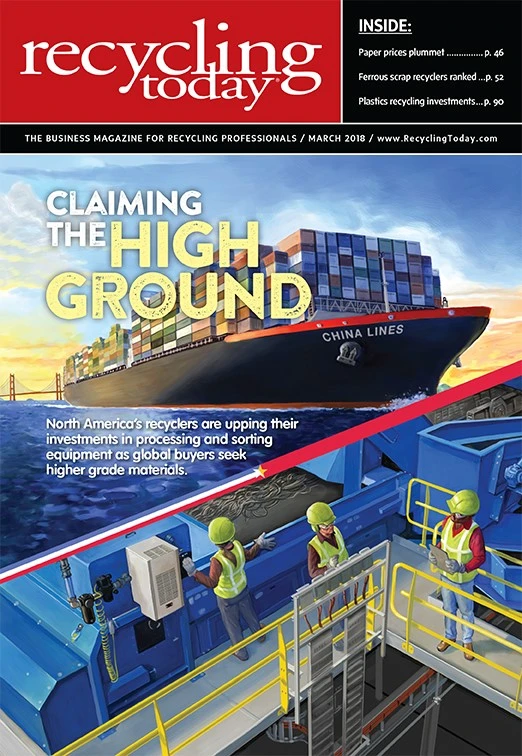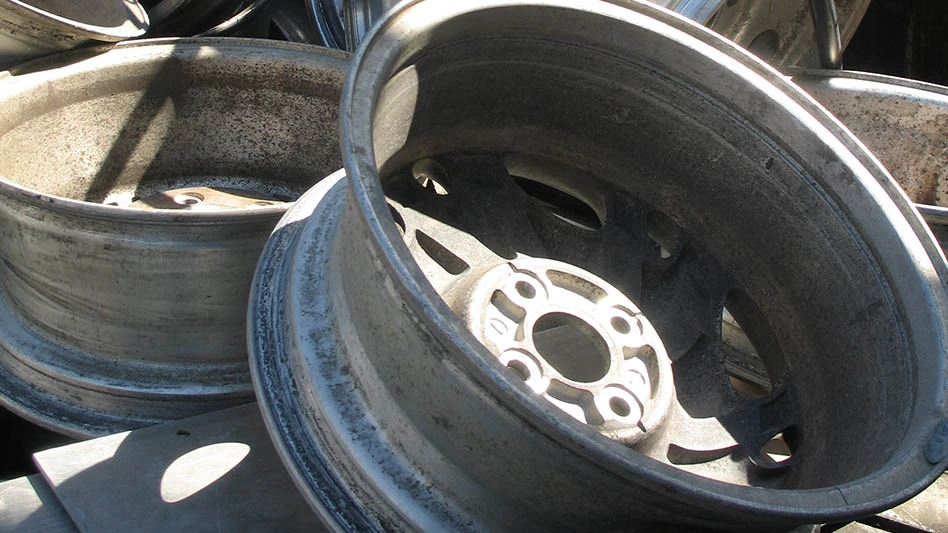AMM announces first trade of its ferrous shredded scrap futures contract

American Metal Market (AMM) has announced that a ferrous shredded scrap futures contract settled against its Midwest index has started trading on the Nasdaq Futures Exchange.
The contract recorded its first trade Jan. 12, 2018.
“The ferrous futures market can now minimize their pricing risks against a robust index that is trusted by both the financial and physical communities,” says Raju Daswani, CEO of Metal Bulletin Group, parent company to AMM. “Key market participants have already started taking advantage of this unique hedging opportunity.”
London-based Metal Bulletin Group is a price reporting agency that serves the global metals and mining markets. The firm has made significant investments to ensure the accountability and
The shredded futures contract will trade 15 months forward and be financially settled monthly against AMM’s Midwest shredded steel scrap index. The 10-gross-ton contract is offered electronically and via a voice broker from 7 p.m. EST Sunday to 5 p.m. EST Friday.
The contract is the result of a partnership between Nasdaq Futures Exchange and World Steel Exchange Marketing (WSEM), Englewood Cliffs, New Jersey, which aims to introduce and market steel and iron ore to global hedgers and institutional investors.
“WSEM and AMM provide market participants an efficient instrument to handle price volatility exposure and bring a higher level of price transparency to all marketplaces,” says Rick Beaman, the Houston-based vice president and head of Nasdaq Futures. “This is a welcome step in our expansion into new asset classes in 2018.”
WSEM CEO Mike Frawley adds, “We are exceedingly pleased to be partnering with NFX to deliver to the marketplace steel contracts that provide both principal and direct market access to the global trading community on a 22-hour-a-day basis.”
AMM says its prices already are the basis of another scrap futures contract. In 2012, Chicago-based CME Group Inc. launched its first U.S. ferrous scrap futures contract based on AMM’s Midwest Ferrous Scrap Index for No. 1 busheling.
Metal Bulletin Group’s prices underpin several other metals futures contracts worldwide, including the CME Copper Premium CIF Shanghai futures contract and the exchange’s duty-unpaid aluminum premium contract. Metal Bulletin Group, owned by Euromoney Institutional Investor PLC, London, provides more than 2,000 independent price benchmarks and assessments for the global steel, nonferrous and scrap markets.
ArcelorMittal to upgrade its Canadian EAF mill

Luxembourg-based ArcelorMittal has announced that its Long Products Canada business unit will invest nearly CA$70 million ($56.8 million) by 2020 in its Contrecoeur, Québec, steel production facilities.
The company indicates it will replace two reheating furnaces at its Contrecoeur-East wire rod mill at a cost of CA$30 million, or $24 million, and its Contrecoeur-West bar mill at a cost of CA$33 million, or $27 million. The new furnaces have been designed to increase ArcelorMittal’s rolling capacity by 100,000 metric tons, enabling greater productivity, optimal energy use and reduced greenhouse gas emissions, according to the company. The work is scheduled for completion in the first half of 2020.
ArcelorMittal says it also will replace the dust collector at the Contrecoeur-West electric arc furnace (EAF) steelworks by the end of 2018 “to improve its performance and increase health and safety for the benefit of our workers and our communities.” That project will cost an estimated CA$6 million ($4.9 million).
“We are renewing ArcelorMittal’s commitment to Québec,” says François Perras, CEO of ArcelorMittal Long Products Canada. “Our choice to invest in the acquisition of high-performance equipment will help us accelerate our move toward high-value-added steel production, particularly for the automotive and construction industries.”
According to an ArcelorMittal news release, the investments were made possible in part by a Québec government electricity rebate program. The electricity rebate is intended for companies engaging in major investment projects in the manufacturing sector as well as in the transformation of natural resources.
ArcelorMittal Long Products Canada employs about 1,500 people in the Quebec cities of Montreal, Contrecoeur and Longueuil and about 200 people in Hamilton, Ontario. It operates a scrap metal processing plant, an iron-ore reduction plant, two steel mills, three rolling mills and two wire-drawing mills. It has an annual production capacity of more than 2 million tons of steel.
Kramer Metals forms new nonferrous company

Los Angeles-based Kramer Metals Inc. has announced it has merged its nonferrous operations with Wilmington, California-based G. Harris International to form Spectrum Alloys LLC. “The merger unites two of the most well-respected, experienced and knowledgeable families in the nonferrous scrap recycling business,” the company states in a press release announcing the merger.
“Spectrum Alloys builds on the synergies that both companies have developed over the last several generations of operations,” says Doug Kramer, president of Spectrum Alloys and Kramer Metals. “It combines the significant processing capabilities and industrial scrap business of Kramer Metals with the commercial and wholesale business of G. Harris to form a stronger company with unlimited growth opportunities.”
The merger of the two companies makes Spectrum Alloys one of the largest regional buyers and exporters of copper and brass scrap on the West Coast, according to the new firm. In addition, the company will be engaged in purchasing what it calls select grades of aluminum and will “place a strong emphasis on purchasing nickel-chrome iron, nickel refinery and stainless steel.”
Spectrum Alloys began operations Sept. 1, 2017. It currently employs 30 workers and operates out of Kramer Metals’ nonferrous location in south Los Angeles.
The new company also has announced that Robb Cohn has joined the firm in the role of
Spectrum Alloys LLC indicates its staff possesses more than 200 years of combined experience in buying, processing, marketing and selling scrap metal grades, including stainless steel, nickel and nickel-based alloys, corrosion-resistant alloys, nickel-copper, nickel-chrome, cobalt and cobalt-based alloys, heat-treat alloys, titanium, tungsten and high-performance alloys.
Novelis to construct automotive sheet plant in Kentucky
Atlanta-based Novelis Inc. has announced plans to build an approximately $300 million automotive aluminum sheet manufacturing facility in Guthrie, Kentucky. The greenfield facility, with a projected annual capacity of 200,000 metric tons, will include heat-treatment and pretreatment lines designed to prepare aluminum for use in vehicle parts, such as hoods, doors, lift gates and fenders. The company says it expects to break ground in the early spring of 2018 and to open the plant in 2020.
The new facility will be near Logan Aluminum Inc., a Novelis joint venture in Russellville, Kentucky, with a large melt shop that currently produces alloys for beverage can production.
In October 2015, Logan Aluminum announced an expansion project that one of its executives indicated would provide it “with greater commercial flexibility by extending the breadth of our product offering to other markets, including automotive.”
“Today’s announcement by Novelis to expand its capabilities in North America is a strategic decision fully supported by the Aditya Birla Group to maintain the group’s leadership position in the global metals sector and its ongoing commitment to serve both upstream and downstream customers,” says Kumar Mangalam Birla, chairman of the board of directors of Novelis and chairman of the board of directors of Hindalco Industries Ltd. “We are immensely proud of this latest investment and look forward to seeing it flourish.”
In a news release announcing the project, Novelis refers to the Guthrie plant as “the latest addition to Novelis’ extensive network of automotive finishing lines.” The company cites a recent study forecasting that aluminum content in North American passenger vehicles “will increase 42 percent from its 2015 level by the year 2028.”
“Aluminum is a growing material of choice for the automotive industry worldwide as auto manufacturers continue to demand more and more aluminum to produce lighter, safer and stronger cars, trucks and SUVs,” says Steve Fisher, president
The company indicates that more than 200 different vehicle models produced in recent years contain Novelis aluminum and that the company has worked with automakers, including Fiat Chrysler, Ford, General Motors, Jaguar Land Rover and Toyota.
Novelis operates in 10 countries, has approximately 11,000 employees and had $10 billion in revenue in its 2017 fiscal year. The company is a subsidiary of India-based Hindalco Industries Ltd., which is part of the Mumbai, India-based Aditya Birla Group.
Commerce Department submits Section 232 reports to president
Jan. 11, 2018, Secretary of Commerce Wilbur Ross formally submitted to President Donald J. Trump the results of the department’s investigation into the effect of steel mill product imports on U.S. national security. This submission was followed by the Jan. 19, 2018, submission of its Section 232 report on aluminum.
Following submission, by law, the president has 90 days in each instance to decide on any potential action based on the findings of the investigations.
Once the president’s decisions are announced, the department will publish a summary of the report in the Federal Register and make the report available to the public after removing confidential or classified material.
In response to the news, Thomas J. Gibson, president and CEO of the American Iron and Steel Institute (AISI), Washington, issued the following statement: “The steel industry welcomes the news that the secretary of Commerce has formally submitted his report to the president in the Section 232 investigation into the impact of steel imports on the national security. We are confident that we have made the case that the repeated surges in steel imports in recent years threaten to impair our national security and we look forward to the president’s decision on the appropriate actions to address this critical situation.”
The Aluminum Association’s President and CEO Heidi Brock released a statement commenting on the submission of the aluminum report that reads in part: “We expect that the report will recognize the significant role the aluminum industry plays in ensuring our nation’s security and welcome the opportunity to engage the administration on an appropriate remedy that will benefit the entire aluminum value chain.”
Real Alloy to close Wisconsin plant
Beachwood, Ohio-based recycled-content aluminum producer Real Alloy, which filed for bankruptcy reorganization in November 2017, has announced it is shuttering its melt shop in Mount Pleasant, Wisconsin.
The company issued an update on its bankruptcy reorganization Jan. 18, 2018, that states in part, “As part of the company’s continued focus on rationalizing costs and improving efficiency, Real Alloy [will] cease operations at its Mount Pleasant facility, which was acquired from Beck Aluminum at the end of 2016.”
The statement continues, “Real Alloy expects to utilize available production capacity in nearby Indiana and Michigan facilities and feels that shutting down the facility allows the business to better utilize production capacity and reduce overall capital needs.”
In other news pertaining to its reorganization, the company has indicated it has received additional DIP (debtor-in-possession) financing that “allows Real Alloy to continue uninterrupted operations throughout the reorganization process, giving Real Alloy the authority to make payments to suppliers and service providers as well as to continue to pay employees wages, salaries
The company’s managers also have said that “since the filing of Chapter 11 in November 2017, Real Alloy has successfully negotiated contracts for 2018 production with several longstanding customers, including major multinational automobile manufacturers and large-scale aluminum producers. The company’s average tenure on its relationship with these customers is over 20 years. Real Alloy has continued to work closely with its suppliers and critical vendors throughout this restructuring process and has received strong support from customers and vendors alike.”

Explore the March 2018 Issue
Check out more from this issue and find your next story to read.
Latest from Recycling Today
- RMDAS April figures show recycled steel price setback
- Steer World offers PEX plastic recycling machine
- New recycling grant program launches in Massachusetts
- Tire Recycling Foundation names executive director
- Dock 7 named 2025 Exporter of the Year at New Jersey International Trade Awards
- Waste Connections reports ‘better than expected’ Q1 results
- Commentary: How EPR is transforming the packaging industry
- Acerinox names new North American Stainless CEO





